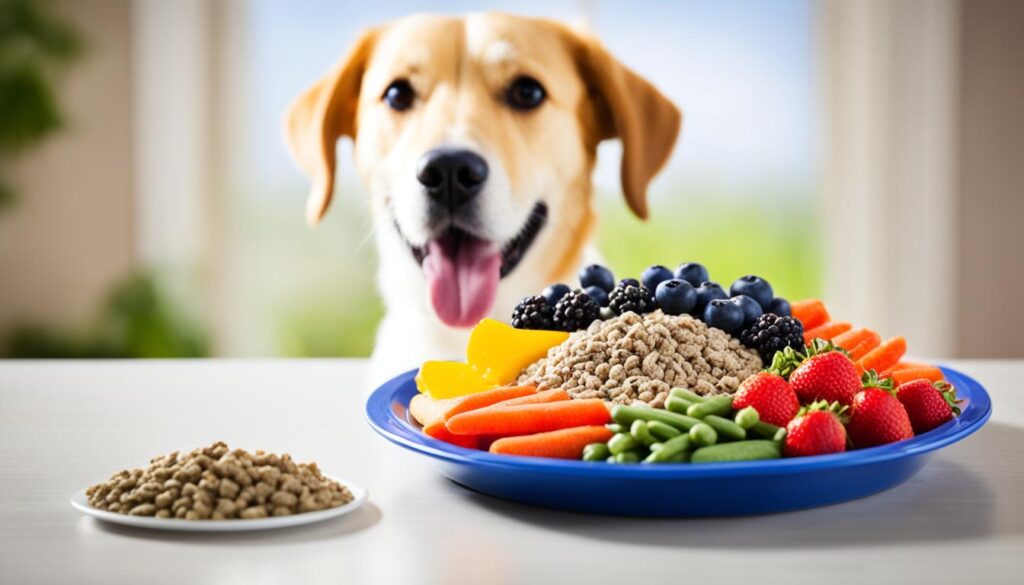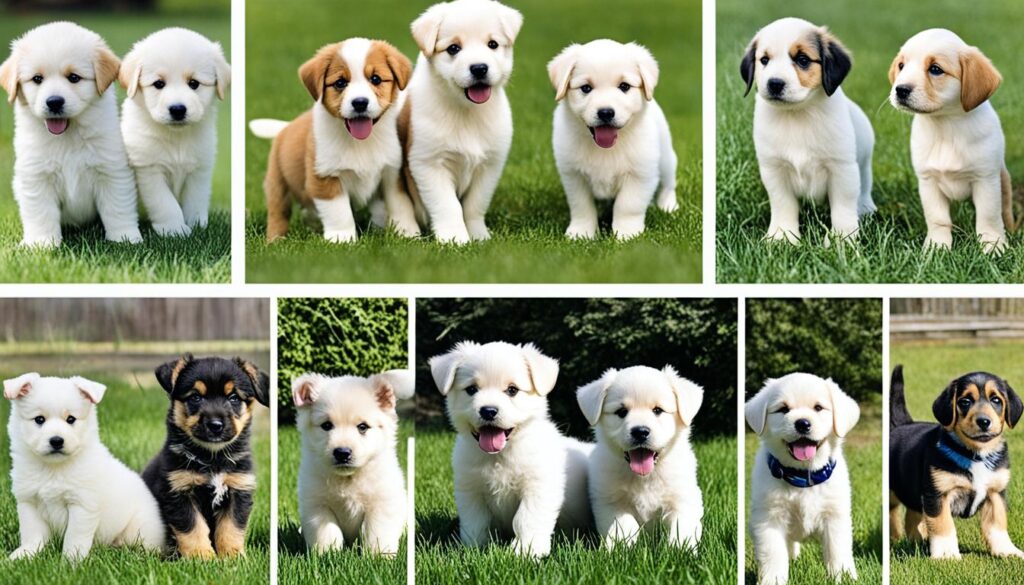Dog food plays a crucial role in sharpening the scent skills of detection dogs. This fascinating part of canine science shows how diet boosts their sniffing powers. Thanks to their scent talents, detection dogs are crucial for security, law enforcement, and health care. The quality of their food significantly affects their smelling abilities. This makes choosing the right dog food as vital as their training.

Key Takeaways
- Understanding the influence of dog food on canine olfactory performance.
- The importance of specialized nutrition for detecting dogs’ scent capabilities.
- Highlighting how specific diets can fine-tune a dog’s sense of smell.
- Research on dog food formulations is needed to optimize olfactory responsiveness in canines.
- Insights into the potential benefits of specific nutrients for scent detection work.
How Does Diet Impact a Dog’s Ability to Sniff?
The legendary sniffing ability of dogs is well-known. Yet, the role of diet in enhancing this skill is often ignored. A healthy diet is vital for a dog’s well-being and sense of smell. It’s essential for those who do scent training or want to improve their dog’s sniffing skills to understand this.
Exploring the Connection Between Olfactory Performance and Nutrition
The food a dog eats directly impacts its sense of smell. A balanced diet helps the nerves and receptors needed for sniffing. Studies show that certain nutrients may improve scent detection by supporting neural health. This shows the complex link between a dog’s diet and sniffing ability.
The Role of Fat in Enhancing Canine Scent Detection
Omega-3 and Omega-6 fatty acids are crucial for the olfactory system’s cell membranes. Dog foods rich in these fats help working dogs perform better. The right amount of fat in their diet can make dogs better at detecting scents.
Dietary Adjustments to Improve Scent Training Results
Changing a dog’s diet can improve scent training outcomes. Trainers can enhance their sniffing performance by meeting a dog’s dietary needs. This may involve adding nutrients that boost brain health and sensory abilities.
- Monitoring protein intake for muscle repair and energy
- Incorporating antioxidants to support immune health
- Ensuring adequate hydration for optimal scent reception
A dog’s diet, ability to sniff, and training approach are interconnected. Customized nutrition plans are essential for dogs in demanding olfactory roles. Roles such as detection, search and rescue, and competitive scent work benefit greatly from tailored diets.
| Nutrient | Benefits to Olfactory Performance |
| Omega-3 Fatty Acids | Improves neural function |
| Antioxidants | Supports immune health for overall well-being |
| Protein | Builds and repairs muscle tissue; provides energy |
| Water | Essential for nutrient transportation and scent detection |
Working with a vet or canine nutritionist is crucial when choosing a diet for a dog’s sniffing skills improvement. A personalized diet can significantly enhance a dog’s ability to detect scents. This makes it a vital aspect of any scent training program.
Choosing the Right Dog Food for Optimal Olfactory Function
Choosing the right dog food is vital for better olfactory function, especially scent work dogs. We’ll examine how dry and wet food differ and what meat sources are best. We’ll also cover why palatability and critical nutrients matter for your dog’s diet. Plus, we’ll explain how to read dog food labels to keep your canine healthy and sharp.
Comparing Dry Food vs. Wet Food: Implications for Scent Work
Both dry food and wet food help a dog’s sense of smell in different ways. Dry food is convenient and helps keep teeth clean, which is suitable for smell. Wet food smells and tastes stronger, making it tempting for dogs in training.

The Importance of Meat Sources and Palatability in Dog Food Selection
The meat sources in your dog’s food greatly affect their ability to smell. Quality proteins are crucial for a strong sense of smell. The tastiness of the food also impacts if a dog wants to eat, affecting their health and scent work skills.
Deciphering Dog Food Labels: Key Nutrients for Detection Dogs
Dog owners need to understand dog food labels. This helps their dogs get the critical nutrients necessary for top-notch smell abilities. Look for these nutrients on labels:
| Nutrient | Benefits for Olfactory Function | Common Sources |
| Protein | Essential for cell repair and muscle growth | Chicken, Beef, Fish, Lamb |
| Fats | Supports nervous system health, including the brain | Salmon oil, Chicken fat, Flaxseed |
| Carbohydrates | Provides energy for physical and mental activities | Whole grains, Sweet potatoes, Peas |
| Vitamins and Minerals | Crucial for metabolic functions | Fruits, Vegetables, Supplements |
Detection dogs get a lot from a diet filled with these critical nutrients.
Supplementary Material and Associated Data from Recent Studies
Recent work has looked into how diet affects scent detection in dogs. Many valuable supplementary materials and data have come from these recent studies. The PMC study is critical, showing the influence of what dogs eat on their sense of smell.
Insights from the PMC Study on Diet and Scent Detection in Dogs
The PMC study highlights the importance of what dogs eat for their sense of smell. It shows that some nutrients significantly affect how well dogs can detect scents. These findings are beneficial for anyone training dogs to sniff out things.
Reviewing the Role of Polyunsaturated Fats and Olfactory Receptors
Polyunsaturated fats play a significant role in making sense of smell better. Found in fish oils and flaxseeds, they help smell receptors do their job well. This discovery is exciting for improving dogs’ diets and training them in scent detection.
| Nutrient | Impact on Olfactory Performance | Food Sources |
| Polyunsaturated Fats | Enhances membrane flexibility of olfactory receptors | Fish oils, flaxseeds |
| Antioxidants | Protects olfactory cells from oxidative damage | Berries, leafy greens |
| Minerals (Zinc) | Supports proper functioning of olfactory system | Meat, shellfish |
Looking closely at supplementary material, research strengthens the link between diet and better scent detection in dogs. There’s an exciting future for using diet to help with smell training.
Practical Advice for Training Detection Dogs: The Role of Food
Starting the journey of training detection dogs means you must understand the role of food. We will explore how a balanced diet plan is crucial to scent training success. By choosing the right food, trainers can help dogs reach their full potential, making them more skilled at scent detection training.
Creating a Balanced Diet Plan for Scent Training Success
Nutrition is crucial for training detection dogs well. Crafting a diet that meets a scent dog’s needs involves proteins, fats, carbs, vitamins, and minerals. This mix boosts their sense of smell, letting them identify scents more accurately.

Start by looking at the dog’s size, age, metabolism, and training intensity. Dogs with intense training need more calories than less active ones.
A good diet ensures the dog is in great shape, boosting their smell abilities. For better energy and focus, include these in your dog’s diet:
- Quality protein for muscle health.
- Essential fatty acids for the brain and thought processes.
- Complex carbs for energy over time.
- Vitamins and minerals for health and immune defense.
Supplementing Your Dog’s Diet to Aid in Scent Detection Training
Adding supplements can improve a dog’s scent training abilities. Omega-3 fatty acids from fish oil can help dogs identify scents.
| Dietary Element | Benefits | Recommended Sources |
| Omega-3 Fatty Acids | Improves brain function and senses. | Salmon, flaxseed, and fish oil supplements. |
| Antioxidants | Fights free radicals, supports the immune system. | Blueberries, cranberries, and green veggies. |
| Probiotics | Enhances digestion and nutrient uptake. | Fermented foods and dog-specific supplements. |
| Water-Soluble Vitamins | Boosts metabolism and nerve health. | Fresh fruits, veggies, and vet-recommended vitamins. |
Supplementing your dog’s diet can help, but always talk to a vet or dog nutrition expert first. Tailored dietary changes can improve training outcomes without health risks.
For detection dogs, nutrition and training success are closely linked. Follow these dietary tips to help your dog excel at scent detection.
The Future of Olfactory Research in Canines: What’s Next?
Science is always moving forward, and dog smell research is getting a lot of attention now. Experts are close to learning how to improve a dog’s sense of smell through their diet. This could be a game-changer for dogs in detection work.
Emerging Trends in Canine Dietary Research and Olfaction
Dog smell research is changing fast, thanks to new studies on their diet. Researchers believe a dog’s diet can significantly affect its ability to smell. They’re looking into particular nutrients to help dogs smell better and improve their brain function for detecting scents.
Anticipating Breakthroughs: How Diet Could Revolutionize Detection Work
The next big thing in dog diet research could be boosting their smell for better detection work. Scientists and dog nutrition experts are excited. They’re working on food that could make dogs better at sniffing out essential scents.
| Aspect of Olfactory Research | Current Understanding | Future Potential |
| Impact of Fatty Acids on Olfaction | Known to influence membrane fluidity and thus receptor function | Refined dietary balance of fatty acids to enhance olfactory sensitivity |
| Role of Antioxidants | Antioxidants are seen to protect olfactory neurons from damage | Targeted antioxidant supplementation for improved olfactory longevity |
| Nutrition for Cognitive Health | Links between cognitive function and olfactory acuity | Advances in cognitive nutrition potentially correlating with olfactory prowess |
| Dietary Impact on Olfaction-Related Behaviors | Behavioral changes noted with dietary adjustments | Strategic diet plans tailored to enhance specific detection behaviors |
Conclusion
The right food makes their sniffing powers stronger. Giving detection dogs the best diet helps them do their jobs better.
Finding the perfect dog food is vital. It must have the proper nutrients to boost its smelling abilities. A good diet is crucial, whether it’s for training or daily meals. It keeps their noses sharp.
In wrapping up, the future looks bright for using diet to improve detection dogs’ work. Every carefully chosen meal can enhance their smell. For those raising detection dogs, focus on nutrition. It unlocks their full smelling potential and leads to breakthroughs in their work.

